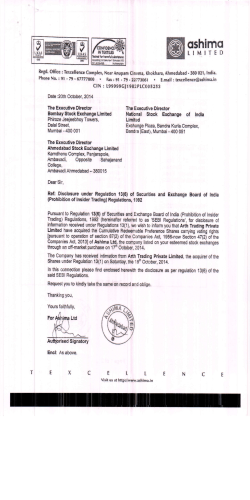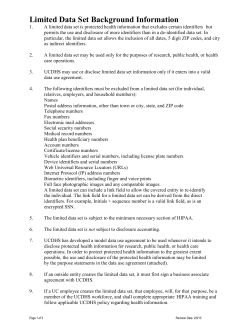
This document is for information purposes only and does not... Financial Limited offers no endorsement that the information contained within...
This document is for information purposes only and does not constitute advice. Sucden Financial Limited offers no endorsement that the information contained within this document is accurate or complete. W8-BEN-E Definitions This document is for information purposes only and does not constitute advice. If any person reading this document requires further information they should seek independent Tax advice. Foreign Financial Institution (FFI). A foreign financial institution (FFI) generally means a foreign entity that is a financial institution. Participating FFI. A participating FFI is an FFI (including a Reporting Model 2 FFI) that has agreed to comply with the terms of an FFI agreement. The term participating FFI also includes a qualified intermediary (QI) branch of a U.S. financial institution, unless such branch is a reporting Model 1 FFI. Intergovernmental Agreement (IGA). An IGA means a Model 1 IGA or a Model 2 IGA. For a list of jurisdictions treated as having in effect a Model 1 or Model 2 IGA, see “List of Jurisdictions” available at www.irs.gov/fatca. A Model 1 IGA means an agreement between the United States or the Treasury Department and a foreign government or one or more agencies to implement FATCA through reporting by FFIs to such foreign government or agency thereof, followed by automatic exchange of the reported information with the IRS. An FFI in a Model 1 IGA jurisdiction that performs account reporting to the jurisdiction’s government is referred to as a reporting Model 1 FFI. A Model 2 IGA means an agreement or arrangement between the U.S. or the Treasury Department and a foreign government or one or more agencies to implement FATCA through reporting by FFIs directly to the IRS in accordance with the requirements of an FFI agreement, supplemented by the exchange of information between such foreign government or agency thereof and the IRS. An FFI in a Model 2 IGA jurisdiction that has entered into an FFI agreement is a participating FFI, but may be referred to as a reporting Model 2 FFI. GIIN means a Global Intermediary Identification Number assigned to a PFFI or Registered Deemed Compliant FFI. Disregarded entity. A business entity that has a single owner and is not a corporation under Regulations section 301.7701-2(b) is disregarded as an entity separate from its owner. A disregarded entity does not submit this Form W-8BEN to a partnership for purposes of section 1446 or to an FFI for purposes of chapter 4. Instead, the owner of such entity provides appropriate documentation. See Regulations section 1.1446-1 and section 1.1471-3(a)(3)(v), respectively. Non-Financial Foreign Entities (NFFEs), An NFFE is any non-US entity that is not treated as a Financial Institution. An NFFE will either be an Active NFFE or a Passive NFFE. Criteria for determining an Active NFFE An Active NFFE is defined as any NFFE that meets ONE of the following criteria: 1 This document is for information purposes only and does not constitute advice. Sucden Financial Limited offers no endorsement that the information contained within this document is accurate or complete. • Less than 50 per cent of the NFFE’s gross income for the preceding calendar year or other appropriate reporting period is passive income and less than 50 per cent of the assets held by the NFFE during the preceding calendar year or other appropriate reporting period are assets that produce or are held for the production of passive income. • The stock of the NFFE is regularly traded on an established securities market or the NFFE is a Related Entity of an Entity, the stock of which is traded on an established securities market. See Section 3.10 for how this should be applied under the Agreement. • The NFFE is organised in a US Territory and all of the owners of the payee are bona fide residents of that US Territory. The definition of US Territory is set out at Article 1 (1) (b) of the Agreement. • The NFFE is a non-US Government, a political subdivision of such non-US Government (which, for the avoidance of doubt, includes a state, province, county, or municipality), or a public body performing a function of such non-US Government or a political subdivision thereof, a government of a US Territory, an international organisation, a non-US central bank of issue, or an entity wholly owned by one or more of the foregoing. • Substantially all of the activities of the NFFE consist of holding (in whole or in part) the outstanding stock of, or providing financing and services to, one or more subsidiaries that engage in trades or businesses other than the business of a Financial Institution. However the entity will not qualify as an Active NFFE if it functions (or holds itself out to be) an investment fund, such as a Private Equity Fund, Venture Capital Fund, Leveraged Buyout Fund or any Investment Vehicle whose purpose is to acquire or fund companies and then hold interests in those companies as capital assets for investment purposes. In these circumstances the entity will be a passive NFFE. • The NFFE is not yet operating a business and has no prior operating history, but is investing capital into assets with the intent to operate a business other than that of a Financial Institution; provided that the NFFE shall not qualify for this exception after the date that is 24 months after the date of the initial organisation of the NFFE. • The NFFE was not a Financial Institution in the past five years, and is in the process of liquidating its assets, or is reorganising with the intent to continue or recommence operations in a business other than that of a Financial Institution. • The NFFE primarily engages in financing and hedging transactions with, or for related entities that are not Financial Institutions, and does not provide financing or hedging services to any entity that is not a Related Entity, provided that the group of any such Related Entities is primarily engaged in a business other than that of a Financial Institution. The NFFE is an “Excepted NFFE” (excluding Direct Reporting NFFEs and sponsored Direct Reporting NFFEs) as described in relevant US Treasury Regulations; or • The NFFE meets all of the following requirements: - It is established and operated in its jurisdiction of residence exclusively for religious, charitable, scientific, artistic, cultural, athletic, or educational purposes; or it is established and operated in its jurisdiction of residence and it is a professional 2 This document is for information purposes only and does not constitute advice. Sucden Financial Limited offers no endorsement that the information contained within this document is accurate or complete. - - organisation, business league, chamber of commerce, labour organisation, agricultural or horticultural organisation, civic league or an organisation operated exclusively for the promotion of social welfare; It is exempt from income tax in its country of residence; It has no shareholders or members who have a proprietary or beneficial interest in its income or assets; The applicable laws of the entity’s country of residence or the entity’s formation documents do not permit any income or assets of the entity to be distributed to, or applied for the benefit of, a private person or non-charitable entity other than pursuant to the conduct of the entity’s charitable activities, or as payment of reasonable compensation for services rendered, or as payment representing the fair market value of property which the entity has purchased; and The applicable laws of the entity’s country of residence or the entity’s formation documents require that, upon the entity’s liquidation or dissolution, all of its assets be distributed to a governmental entity or other non-profit organisation, or escheat to the government of the entity’s country of residence or any political subdivision thereof. Passive Income The term “passive income” means the portion of gross income that consists of1. Dividends, including substitute dividend amounts; 2. Interest; 3. Income equivalent to interest, including substitute interest and amounts received from or with respect to a pool of insurance contracts if the amounts received depend in whole or part upon the performance of the pool; 4. Rents and royalties, other than rents and royalties derived in the active conduct of a trade or business conducted, at least in part, by employees of the NFFE; 5. Annuities; 6. The excess of gains over losses from the sale or exchange of property that gives rise to passive income described in items 1 to 5; 7. The excess of gains over losses from transactions (including futures, forwards, and similar transactions) in any commodities, but not including— (i) Any commodity hedging transaction described in section 954(c)(5)(A) of the U.S. Revenue Code, determined by treating the entity as a controlled foreign corporation; or (ii) Active business gains or losses from the sale of commodities, but only if substantially all the foreign entity’s commodities are property described in paragraph (1), (2), or (8) of section 1221(a) of the U.S. Revenue Code; 8. The excess of foreign currency gains over foreign currency losses; 9. Net income from “notional principle contracts”. These are financial instruments that provide for the payment of amounts by one party to another at specified intervals calculated by reference to a specified index upon a notional principal amount in exchange for specified consideration or a promise to pay similar amounts (NB: in the UK this would normally be a swap); 10. Amounts received under cash value insurance contracts; or 11. Amounts earned by an insurance company in connection with its reserves for insurance and annuity contracts. However, the following amounts are excluded from any calculation of Passive Income 3 This document is for information purposes only and does not constitute advice. Sucden Financial Limited offers no endorsement that the information contained within this document is accurate or complete. 1. Any income from interest, dividends, rents, or royalties that is received or accrued from a related person to the extent such amount is properly allocable to income of such related person that is not passive income. For purposes of this section, a person is a related person with respect to the NFFE if— (A) such person is an individual, corporation, partnership, trust, or estate which controls, or is controlled by, the NFFE, or (B) such person is a corporation, partnership, trust, or estate which is controlled by the same person or persons which control the NFFE. 2. In the case of an NFFE that regularly acts as a dealer in property described in item 6 above of this section (referring to the sale or exchange of property that gives rise to passive income), forward contracts, option contracts, or similar financial instruments (including notional principal contracts and all instruments referenced to commodities) (i) Any item of income or gain (other than any dividends or interest) from any transaction (including hedging transactions and transactions involving physical settlement) entered into in the ordinary course of such dealer’s trade or business as such a dealer; and (ii) If such dealer is a dealer in securities, any income from any transaction entered into in the ordinary course of such trade or business as a dealer in securities. 4
© Copyright 2025

















